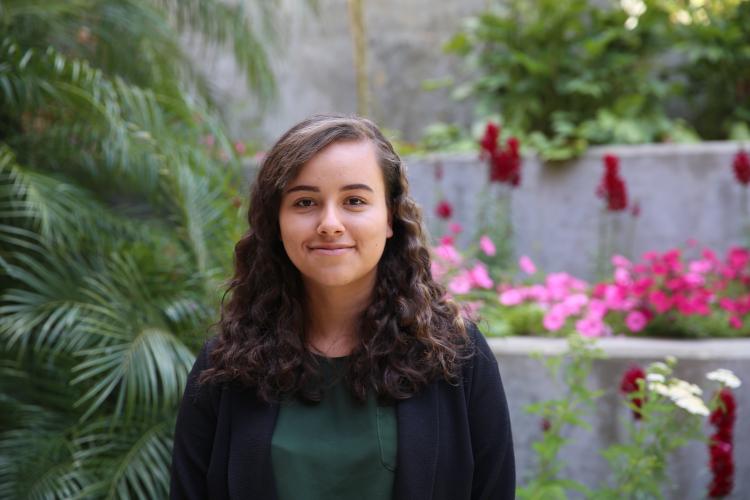Student Spotlight: Celina Meyer

Florida State University psychology and statistics student and undergraduate researcher Celina Meyer. Photo by FSU Photography Services.
Celina Meyer is a senior pursuing dual bachelor’s degrees in psychology and statistics, through the Department of Psychology and the Department of Statistics, both part of the College of Arts and Sciences. Her interest in the fields of childhood development and psychopathology led her to win the prestigious Garnet and Gold Scholar Society IDEA Grant that would further her research into preventing long-term psychological effects resulting from childhood adversity. Meyer is on track to graduate in Spring 2021, and hopes to transition her research into early intervention methods that would help children cope with adversity in their formative years.
Where are you from? What brought you to FSU?
I grew up in Orlando, Fla., and went to Colonial High School where I graduated with an AICE Cambridge Diploma, which is an internationally recognized diploma awarded to high school students for their completion of academically rigorous courses. I saw Florida State University was a leading school in the field of psychology and that the department offered many opportunities to set myself apart academically. I thought the campus was beautiful and I loved the sense of community, so I developed my school spirit early on.
Tell us about your research. What inspired you to choose your majors and your specific area of research?
I chose psychology as my first major because I took a few classes on it in high school and was familiar with some of its more infamous literature such as the Stanford prison experiment, and Milgram’s obedience experiment. I wanted to figure out my path within psychology as early as possible, so I completed a data analysis internship the summer after freshman year. I came back to FSU and chose to start a dual degree with statistics as the other major.
I fell in love with the research into childhood adversity after learning about it during a course taught by FSU scientist Natalie Sachs-Ericsson. My research takes a neuropsychological approach to examining the long-term effects of childhood adversity across the lifespan with a focus on executive functioning in the brain, visualized with electroencephalogram (EEG) scanning. The novel part of my research addresses household chaos, which is the instability and disorganization within a child’s home environment.
You were awarded the Garnet and Gold Scholar Society IDEA Grant in 2019 for your research into the effects of childhood adversity. What was that experience like? Have you earned any additional accolades since then and, if so, what were they?
I was inspired to move forward with my inquiries and secure a second IDEA Grant in 2020 to help complete my honor’s thesis, which involves tackling the limitations of my first study and investigating my questions more in depth. My biggest takeaway from these experiences is that it’s important to look at every scientific finding as meaningful, especially when the result is not what you expected. When study results do not align with my hypotheses, it simply means that I have found something even more novel and interesting on its own.
Directed Individual Study is a structured opportunity for undergraduate students to conduct lab research with an FSU professor. Tell us about your experience as a DIS student? Would you encourage others to take part?
I highly recommend becoming a DIS student. Having the experience of working in a lab and receiving course credit is crucial to developing into a professional as you gain long-term mentors who guide you while allowing you the autonomy to explore and refine your interests.
What aspects of psychology do you find most interesting? How does your concurrent study of statistics help with your research?
What I find most interesting is how broad the field of psychology is. No matter what you are interested in, there are plenty of directions to take and multiple perspectives to examine. With statistics, the ability to model development with a set of variables helps me to better understand my data and its long-term effects.
Who are some of the faculty or staff that have helped you in your academic career, and how have they impacted your work?
FSU scientist Natalie Sachs-Ericsson and assistant professor Alexandria Meyer, both from the Department of Psychology, were the ones who first introduced me to the topics of childhood adversity and brain imaging. Julia Sheffler, assistant professor at the College of Medicine from the Center for Translational Behavioral Science, has been my mentor for more than three years and continues to be a strong support system and guide in my professional advancement. The push for multidisciplinary collaboration in my research is with the help of University Distinguished Endowed Professor Sylvie Naar, Director of the Center for Translational Behavioral Science.
In what ways do you think the COVID-19 pandemic will impact your future research into adverse childhood experiences?
COVID-19 represents a chronic stressful experience similar to many adverse childhood experiences I study, but the varied responses to the pandemic could make it more difficult to measure the effects of other childhood stressors on development. Ultimately, I am hopeful that the pandemic will not have an entirely negative effect on my research.
What do you like to do when you’re not doing schoolwork?
I like to look at any recent medical literature, attempt to write manuscripts, and occasionally step away to walk my dog in the parks around Tallahassee.
What are some of the long-term goals you hope to achieve after graduation?
In addition to getting my doctorate in Psychology, I would like to become a professor. As an educator, I am able to combine my three passions of research, statistics, and teaching in a way that inspires others to achieve their goals.
What advice do you have for fellow students?
Never compare yourself and your achievements to others. Not everyone has the same motivations, so you must write your own story and become successful at your own pace.
